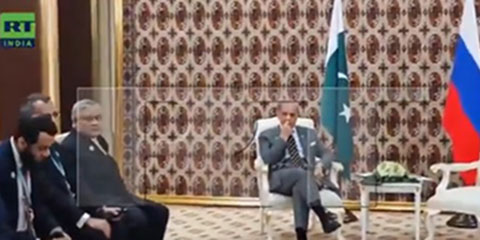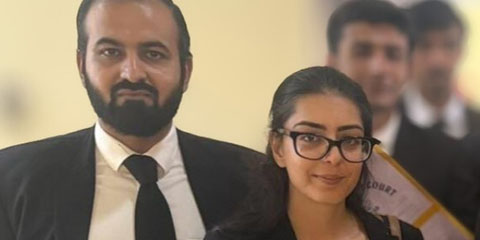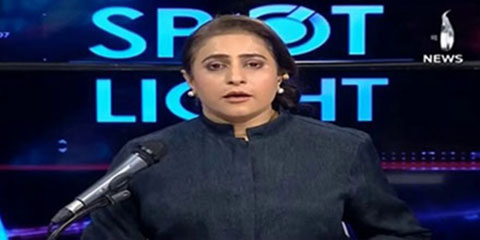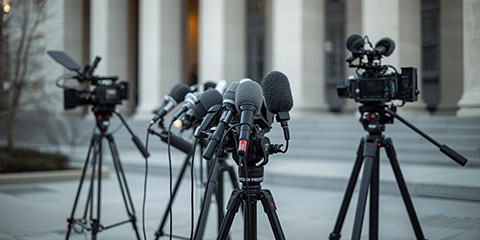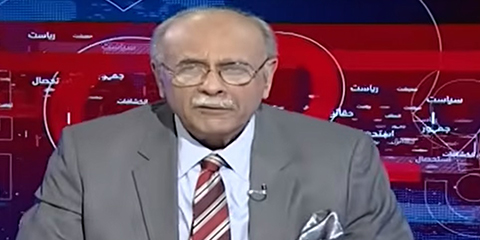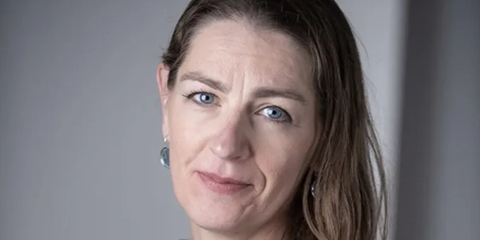Everything you wanted to know about PFUJ's Lahore Declaration
JournalismPakistan.com | Published 4 years ago
Join our WhatsApp channel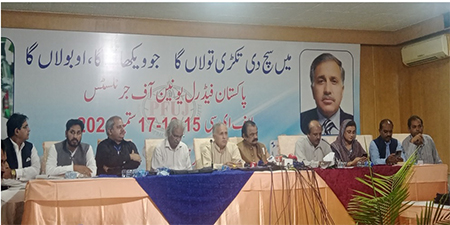
LAHORE- On Friday, the Pakistan Federal Union of Journalists (PFUJ) issued the following Lahore Declaration following its three-day Federal Executive Council (FEC) meeting.
1. A meeting of the Federal Executive Council (FEC) of the PFUJ was held in Lahore from 15 to September 17, 2021, under the chair of President Shahzada Zulfiqar to discuss a detailed agenda. This included the crisis issues of disappearances, threats, retrenchments, and pay cuts of journalists, media workers, the proposed controversial Pakistan Media Development Authority (PMDA), and the overall deteriorating state of press freedom and expression.
2. The FEC expressed anguish over the growing threats to the lives of the journalists and media workers and continued attempts of forced disappearances and attacks on them across the country and gave an urgent call for an end to total impunity to attackers and criminals involved in crimes against journalists and media workers, their immediate arrest and prosecution.
3. The FEC expressed concern at the slow pace of adoption of the federal law lying before the National Assembly Standing Committee on Human Rights under the title of ""Journalist Protection Bill."" It called for its urgent and unanimous adoption by both houses of parliament to safeguard journalists' lives and bring criminals to justice.
4. The FEC welcomed the Sindh government's enactment of a law on the safety of journalists and called for its urgent operationalization by completing the nominations of members of its implementation commission as soon as possible. It also urged the Balochistan, Khyber Pakhtunkhwa, and Punjab governments to fulfill similar obligations and table laws to protect journalists and media workers before their respective legislatures urgently. It also urged the provincial governments for consultations with PFUJ and other relevant stakeholders before tabling the laws for adoption.
5. This FEC deliberated in detail the proposed PMDA. It concluded that its establishment is nothing but a nefarious attempt to impose restrictions on media further. It aims at arm-twisting media houses and journalists and setting strict limits on freedom of expression online, mainly social media, to deter public interest journalism and use of the internet by digital freelance journalists.
6. The FEC unanimously rejected the idea of PMDA. It called for the unconditional withdrawal of the proposed merger of all media regulators. It would severely undermine freedom of expression and independent journalism by serving as a centralized ''headquarter of censorship'' and a ''one window operation'' to control public interest narratives and thereby operating as a ''media martial law.'' The FEC instead proposed that discussions be initiated with media sector stakeholders, civil society, and political parties to reform the existing media-related laws, which martial law governments have mostly enacted, to make them democratic, media-friendly, and public interest focused.
7. The FEC lauded the unity shown by the entire journalists' community, media workers, civil society, lawyers, human and digital rights organizations, trade and labor unions, and democratic political parties during the historic dharna against PMDA on the eve of the presidential address to the joint sitting of the parliament on September 13, 2021. It thanked all of the participants, including opposition parties in the parliament, for showing total solidarity with journalists for upholding the freedom of press and expression.
8. The FEC took up ever-expanding retrenchments, non-payment of salaries, delayed payments, and cuts in salaries of journalists and workers, and partial implementation of the 8th Wage Board Award by some media houses and the merger of allowances in pay packages, which has reduced the salaries of journalists and media workers.
9. The FEC demanded the complete implementation of the 8th Wage Board Award in letter and spirit and urged for the restoration of pay cuts imposed during the financial crisis and the Covid pandemic, severely hurting the families of journalists and media workers.
10. The FEC once again identified (i) diminishing press freedoms, (ii) intensifying censorship and press advice, and (iii) growing unholy collaboration between media owners and government actors in depriving media workers of their rights as the main problems facing the media industry and media workers in Pakistan.
11. The FEC concluded that there is an evident hidden agenda of the government to optimally destroy press freedom and crush media workers' rights in complicity with arm-twisted media owners through economic strangulation and financial browbeating of journalists and crushing of enabling environment for media to flourish as a central tenet of a democratic order.
12. The FEC expressed deep concern at the profound financial hardships and loss of livelihood of journalists that has resulted in the loss of jobs to some 15,000 journalists and other media workers. It said it was a direct result of anti-media policies of the government, being implemented through owners of the media houses who are now touting and implementing this policy for their own financial and monetary gains by ignoring the basic mission of journalism of press freedom and freedom of speech guaranteed in Article 19 of the constitution.
13. The FEC expressed distress over the enforced termination and layoffs of journalists and anchors from TV channels and threats to independent journalists forced to switch to the internet media to work as digital freelancers and YouTube to earn their livelihoods.
14. The FEC also took up the issue of pampering the illegal and drawing-room journalists' bodies and using them as a tool to spread disinformation and for achieving anti-media and anti-journalists agenda ill-conceived by some government ministers that are harming democracy.
15. The FEC criticized the government for allowing and even forcing media regulators, including Pakistan Electronic Media Regulatory Authority (PEMRA), Pakistan Press Council (PCP), and Pakistan Telecom Authority (PTA) to exceed their mandates and use coercive means to hound journalists and pressure media houses to crush freedom of expression and professional journalism. It reminded that the principal responsibility of these bodies is to regulate the media industry, not control content or journalism.
16. The FEC expressed dismay at the intent of the government to enforce ill-conceived advertisement policies that have ended up completely uprooting the traditional and successful media economic landscape with the result that media houses have lost public sector advertising and journalists have lost jobs and the citizens of Pakistan have lost sources of reliable and professional public interest journalism.
17. The FEC condemned the increasing tendency of government to use the Prevention of Electronic Crimes Act (PECA) to target both journalists and citizens in their pursuit of reliable information and professional journalism as a means of expanding the net of censorship, stifling free speech, muting diversity and pluralism of public voices and crushing dissent that are intrinsic hallmarks of democracy.
18. The FEC took serious notice of the overt misuse of the Federal Investigation Agency (FIA) against journalists and anchorpersons and condemned the government and FIA for issuing warnings to journalists through its anti-terrorism wing.
19. The FEC noted that all these measures of the government and its media regulators have resulted in large-scale destruction of Pakistan's professional media industry and thriving regional press and ended in a hostile takeover of media by anti-people interests bent upon unraveling Pakistan's democratic and pluralist character.
20. The FEC warned of serious repercussions of the anti-media, anti-journalists and anti-media workers policies of the government and demanded an immediate and complete reversal of such policies for safeguarding press freedom, freedom of expression and right to information so that Pakistan returns to the fold of thriving democracies.
21. The FEC expressed anguish at the continued and increasing cases of trolling of journalists, TV anchors, particularly women journalists, by troll brigades designed to reduce the space for press freedom. It termed the use of state resources to finance these troll armies as undermining the state.
22. The FEC termed freedom of press and expression as per the vision of Father of the Nation Quaid-e-Azam Muhammad Ali Jinnah, who wanted Pakistan to be a democratic country espousing and practicing human and fundamental rights for all communities without discrimination of religion, sect, ethnicity, and gender biases.
23. The FEC called upon the superior judiciary to speed up the proceedings of freedom of press and expression pending before the Supreme Court of Pakistan. Attacks on these constitutionally guaranteed rights are being rapidly eroded and will end up unraveling the trichotomy of the state pillars and the fourth estate.
24. The FEC urged the government to rationalize advertisement rates and policy as per the growing expenses of running day-to-day operations of media houses, price hikes, and inflation due to economic turmoil due to inconsistent policies and the pandemic.
25. The FEC contended that pending arrears of Rs6 billion have not yet been cleared by Press Information Department of the Federal Ministry of Information and Broadcasting, which is preventing revival of media industry because the pending dues are not being cleared and salaries of journalists and media workers are not being restored to the level of pre-crisis period.
26. The FEC pledged that the PFUJ would continue to resist all efforts to destroy the media sector and punish journalists and media workers for their public interest journalism and resisting efforts by undemocratic forces to undermine democracy.
27. The FEC meeting of PFUJ concluded with the vigorous demand of ensuring job security for journalists and media workers, freedom of press and freedom of expression, including both offline and online, without which transparency and good governance cannot be possible and without which democracy and democratic institutions cannot be strengthened in Pakistan.




